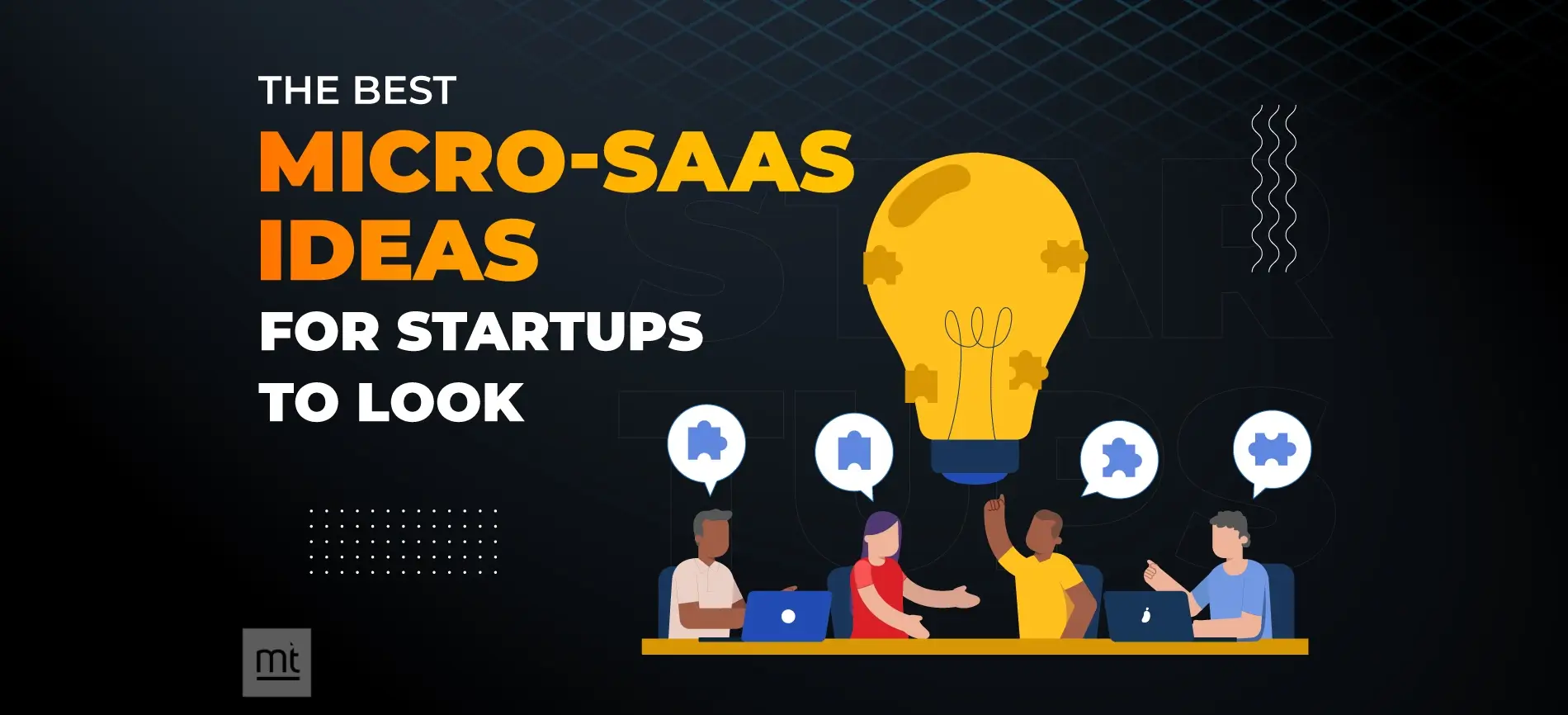Introduction:
Here is a guide called "Tech Startup Ideas: Best Profitable Tech Startup Ideas for Entrepreneurs" that aims to encourage and enable ambitious innovators to start their businesses in the fast-paced world of technology. Disruptive innovation has limitless potential in today's fast-paced, constantly-evolving world, offering exciting chances to those with big ideas and the will to see them through to completion.
This extensive resource examines a carefully chosen range of the most lucrative and successful tech company concepts in several industries. Every proposal, from augmented reality in e-commerce to cybersecurity solutions for small businesses, comes with information about the sector or category, potential business models, the time needed to construct the MVP and successful case studies.
This guide is your road map to finding profitable possibilities and leaving a lasting impression in the field of technology and innovation, regardless of your level of experience as an entrepreneur seeking your next project or your level of inexperience with tech businesses. Prepare to unleash your inner businessperson and realise your dream.
What are Tech Startups?
Tech startups, a vibrant and inventive sector of the world's economic scene, have drawn a lot of attention because of their ability to upend established markets and progress technology. These emerging businesses, which creative entrepreneurs frequently start, use cutting-edge technology to design and implement innovative solutions to challenging issues and generate new business opportunities.
Over 100,000 tech startups worldwide make up the $3 trillion global tech startup ecosystem, according to the Global Startup Ecosystem Report 2023. Venture capital investments reached $320 billion in 2022, a 25% increase from the previous year, indicating a rise in funding for digital startups. With 60% of all venture capital investments made globally, the US continues to lead the field. Fintech, health tech, and cybersecurity are the three most active businesses for tech companies, and these sectors also draw the majority of venture capital investments.
Ninety percent of startups fail in the first five years, which is another characteristic of the tech startup environment. However, the rise of tech businesses like Airbnb, Uber, and Slack has encouraged a new wave of entrepreneurs to follow their passions and develop ground-breaking ideas.
Despite the high failure rate in the tech startup environment, success stories from these companies continue to motivate a new generation of entrepreneurs to follow their passions and develop ground-breaking solutions. The future of digital companies is bright and hopeful, with venture capital investments expected to reach $320 billion by 2022 and the global ecosystem of tech firms valued at $3 trillion.
Emerging Trends in Technology
Examining the latest technological developments offers entrepreneurs looking to take advantage of creative potential insightful information. Startups can obtain a competitive edge and develop revolutionary products by leveraging the following trends:
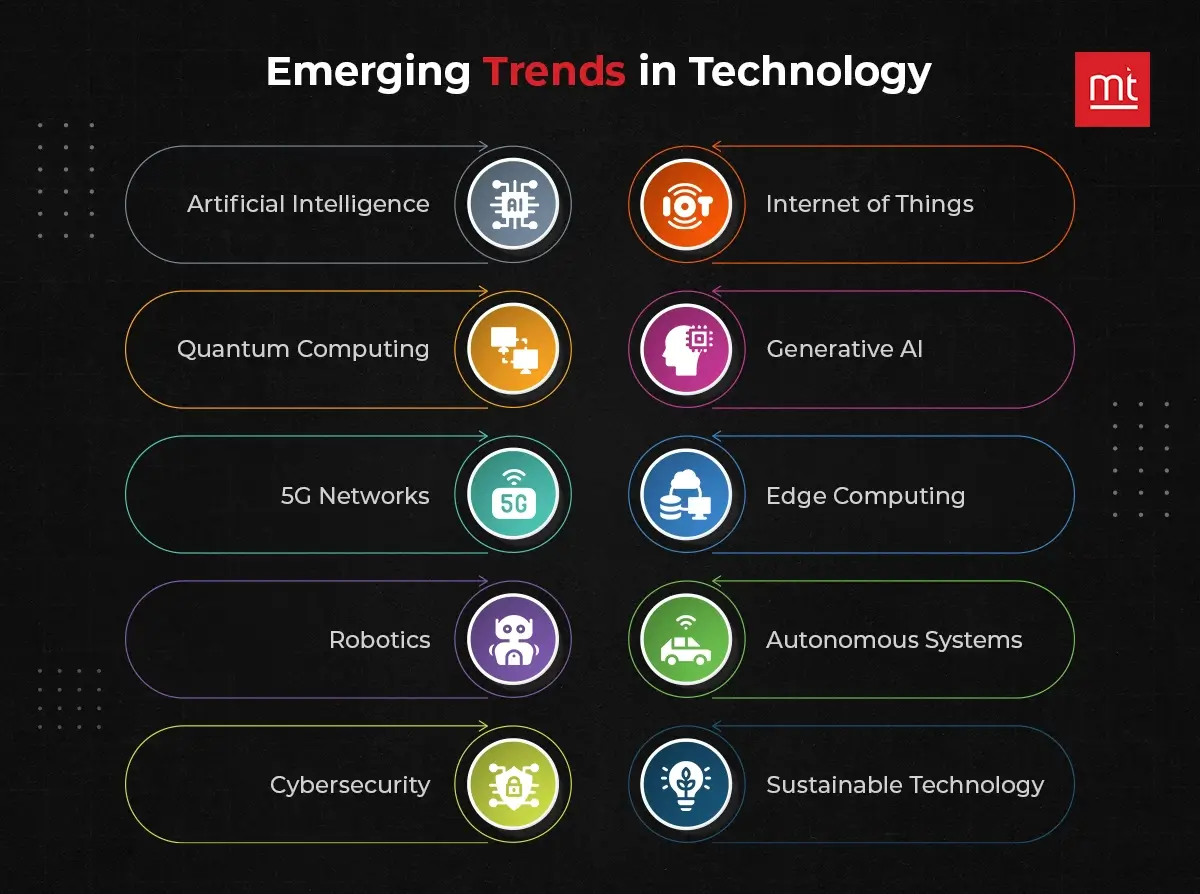
- Artificial intelligence (AI): By enabling more intelligent goods and services like chatbots and tailored recommendations, AI is revolutionising a number of industries.
- Internet of Things (IoT): As IoT devices proliferate across numerous industries, companies will have more chances to create ground-breaking solutions for smart cities, smart homes, and intelligent enterprises.
- Quantum computing: By resolving complicated issues that conventional computers are presently unable to handle, quantum computing has the potential to transform a number of industries completely.
- Generative AI: This technology is giving robots the ability to produce material that seems like it was created by humans, which is creating new prospects for creative industry firms.
- 5G networks: By enabling new apps and services, including AR and VR, and enhancing connectivity, 5G networks are predicted to transform a number of industries completely.
- Edge Computing: Growing across a range of industries, edge computing offers companies the chance to create products that reduce latency and enhance data processing.
- Robotics: As robots become more human-like, companies will have more opportunities to create solutions for sectors including manufacturing, logistics, and healthcare.
- Autonomous Systems: In order to foster innovation in the delivery and logistics industries, startups are focusing on developing autonomous systems.
- Cybersecurity: As new dangers arise, cybersecurity is changing to keep up with them. This presents chances for startups to come up with creative ways to safeguard systems and data.
- Sustainable Technology: To solve global concerns, startups are concentrating on developing more sustainable technologies, like decentralised power grids and green hydrogen.
These developments give entrepreneurs the chance to develop original ideas and obtain a competitive advantage in their specialised markets. Startups can take advantage of new opportunities and make strategic decisions by keeping up to date with developing technology developments.
Market Research and Analysis
For entrepreneurs to reduce risks and make well-informed decisions, thorough market research is crucial. It helps business owners comprehend client wants, evaluate the competitive environment, and spot possible opportunities. Startups can reduce the risk of failure and optimise their plans for long-term growth by performing thorough market research.
Tools and Methods for Conducting Effective Market Analysis
- Surveys & Questionnaires: Direct feedback from prospective clients can yield insightful information about their needs and areas of discomfort.
- Competitor Analysis: Analysing competitors' advantages and disadvantages can assist businesses in finding market gaps and creating distinctive selling propositions.
- Market segmentation: Startups can more successfully customise their offers by breaking the target market into discrete groups according to attributes like demands, behaviour, and demographics.
- Trend analysis: By keeping an eye on consumer and industry trends, businesses can foresee shifts in the market and modify their plans appropriately.
- Data Analytics Tools: By utilising these tools, companies can collect and examine vast amounts of data in order to spot patterns and trends and make data-driven decisions.
- Social Media Listening: Keeping an eye on social media sites for conversations and comments on the market and products available might yield insightful information about the sector.
Startups can boost their chances of success by employing these tools and techniques to obtain a thorough grasp of their target market, spot opportunities, and make wise decisions.
The search results that were given needed more specialised instruments and techniques for carrying out efficient market analysis. Nonetheless, the methods above are frequently employed in the field and advised for newcomers conducting market research.
Popularity of Tech Startups
Tech startups are well-liked and have attracted a lot of attention because of their potential to upend established markets and develop technology, according to a number of sources. The top three states for startup activity are Massachusetts, New York, and California. The United States continues to be the primary hub for tech businesses. Still, other parts of the world, like Europe, Asia, and Latin America, are expanding quickly and adding to the global ecosystem of tech startups.
As of 2021, JUUL Labs was the most funded tech startup in the United States. As of November 2021, America led the globe in the number of fintech companies with 10,755. At 21 billion dollars, Byju was the most valuable unicorn as of July 2022.
The US Bureau of Labour Statistics estimates that up to 90% of startups fail in practically all industries, with the failure rate within the first year being around 10%. However, the rise of tech businesses like Airbnb, Uber, and Slack has encouraged a new wave of entrepreneurs to follow their passions and develop ground-breaking ideas.
An Actionable 8 Step Guide to Build a Tech Startup in 2025
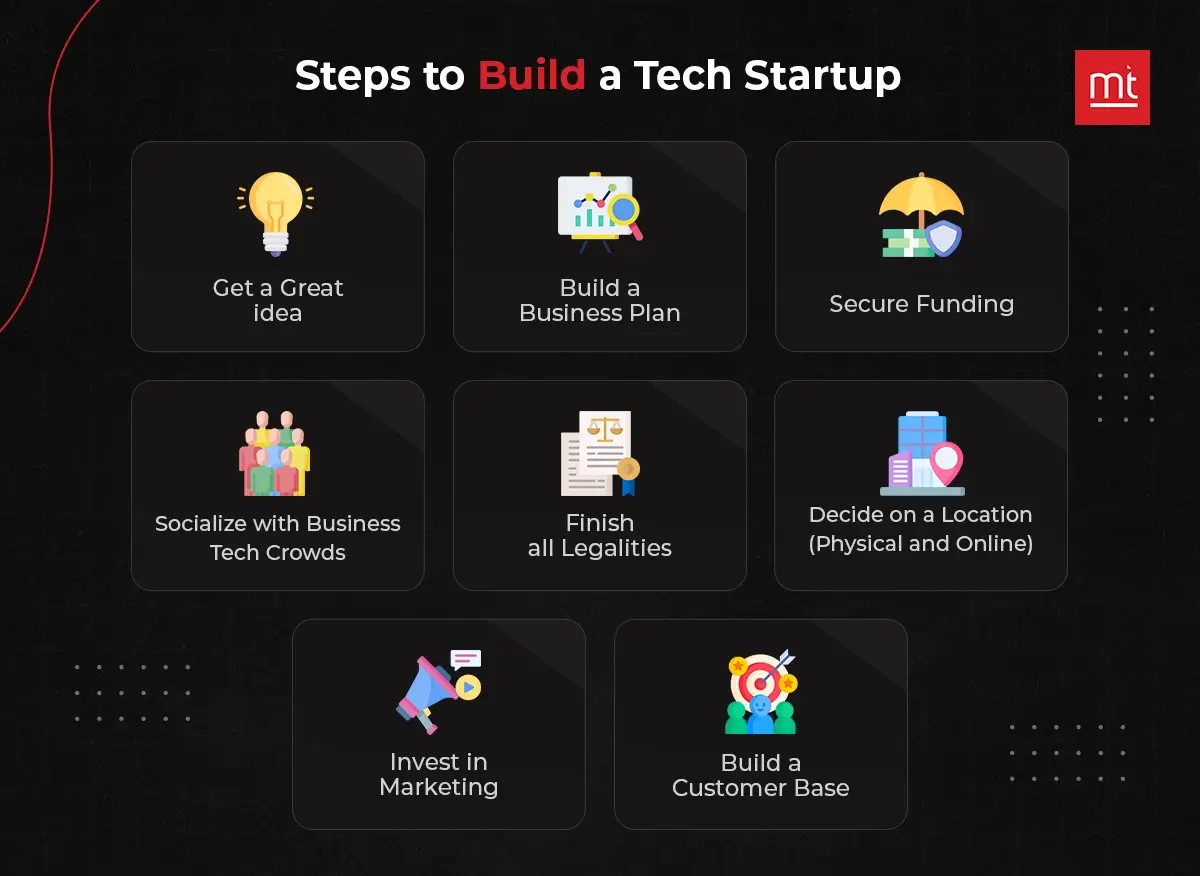
Step 1: Get a great idea
A firm grasp of consumer problems or market gaps is frequently the foundation of a successful digital startup. A fantastic idea is born from this comprehension and a creative spark. To find possibilities ready for disruption, a lot of research, brainstorming, and ideation sessions are needed.
Observations of inefficiencies in current solutions, industry trends, new technologies, and personal experiences are frequently sources of inspiration for innovators. After being identified, the idea is validated through user feedback, market research, and feasibility studies to make sure it is workable and has room to grow.
Step 2: Build a business plan
Creating a solid business plan is similar to creating the road map for a startup. Developing a clear mission, vision, goals, and objectives for a startup requires careful planning and strategic thought.
A detailed examination of the target market, the competitive environment, customer personas, and the value proposition are all included in the business plan. It outlines the price plan, distribution channels, revenue model, and sales projections of the firm.
Financial predictions, budgetary allotments, and milestone schedules provide a plan for tracking progress and obtaining money. The business plan also functions as a living document that can be modified to reflect changing market conditions and internal expansion plans.
Step 3: Secure funding
Getting finance allows a digital firm to develop its operations and realise its vision, which is a critical milestone in the company's lifespan. The procedure includes determining the best funding sources based on the industry, growth trajectory, and stage of the firm.
While self-financing allows for greater autonomy, it may also limit the possibility of growth for the firm. It Is known as bootstrapping. In return for stock, angel investors provide early-stage money injections, industry connections, and coaching. Large sums of money are invested in disruptive, fast-growing enterprises by venture capital firms.
Other sources of funding include accelerator programmes, government grants, and crowdsourcing websites. An engaging pitch deck, a strong business strategy, and an engaging story that satisfies investors' thirst for novelty and profits are essential components of a successful fundraising campaign.
Step 4: Socialize with business tech crowds
In the tech sector, networking entails more than just forging casual relationships; it also entails immersing yourself in a group of like-minded people who may provide priceless chances, support, and insights.
You can network with other business owners, possible investors, mentors, and industry experts by going to conferences, meetups, and industry events. Engaging in virtual discussion boards, communities, and social media affinity groups offers prospects for information exchange, guidance solicitation, and interpersonal development.
Engaging in active social interactions with business tech communities allows you to learn about current market trends, find possible partners or collaborators, and gain access to resources that can help your startup expand.
Step 5: Finish all legalities
Building a software startup requires navigating the legal environment in order to assure compliance, safeguard intellectual property, and reduce risks. This entails a number of legal responsibilities, including creating contracts and agreements, obtaining licences and permits, registering the business, and protecting intellectual property rights via patents, trademarks, and copyrights.
Startups also have to abide by laws pertaining to consumer protection, data privacy, and industry-specific standards. Consulting with startup accelerators or seeking advice from legal experts can assist guarantee that all legal matters are entirely handled, providing a solid base for the operations and expansion of the startup.
Step 6: Decide on a location (Physical and Online)
Tech businesses must spend money on marketing if they want to grow, draw clients, and raise their profile. Digital content, social media, and search engine optimization (SEO) are just a few of the channels that a well-designed marketing plan should utilise.
Startups can produce content and messaging that appeals to potential customers by researching the market and their target demographic. Startups can enhance their sales and revenue by implementing marketing activities, including influencer collaborations, email marketing, and advertising campaigns.
These strategies can help them efficiently reach their target audience and produce leads.
Step 7: Invest in marketing
Selecting a site is an essential first step in developing a digital startup since it has a significant influence on the business's performance. Factors including cost of living, accessibility to talent, and closeness to industry hubs are critical when evaluating physical locations.
Tech hotspots like Silicon Valley, New York City, or up-and-coming tech centres like Austin or Berlin are popular places for entrepreneurs to set up shop. Nonetheless, several firms now place less value on physical location due to the growth of remote work and digital connectivity, choosing instead to use scattered or entirely remote staff.
A solid online presence via a website, social media accounts, and online marketplaces can increase a startup's reach and accessibility to clients worldwide. An online presence is equally important.
Step 8: Build a customer base
For a software firm to be sustainable over the long run, building a solid customer base is essential. Startups ought to concentrate on providing their target market with outstanding goods or services that address pressing issues.
Startups can cultivate strong customer relationships and encourage loyalty by placing a high priority on client happiness and actively seeking feedback. Startups can improve the way they organise and handle client contacts by implementing customer relationship management (CRM) software.
Furthermore, companies can drive sustainable app development and income by employing customer acquisition methods including partnerships, referral programmes, and customised marketing campaigns to draw in new clients and hold onto current ones.
Best Tech Startup Ideas for Entrepreneurs in 2025 (Tech Startup Business Ideas)
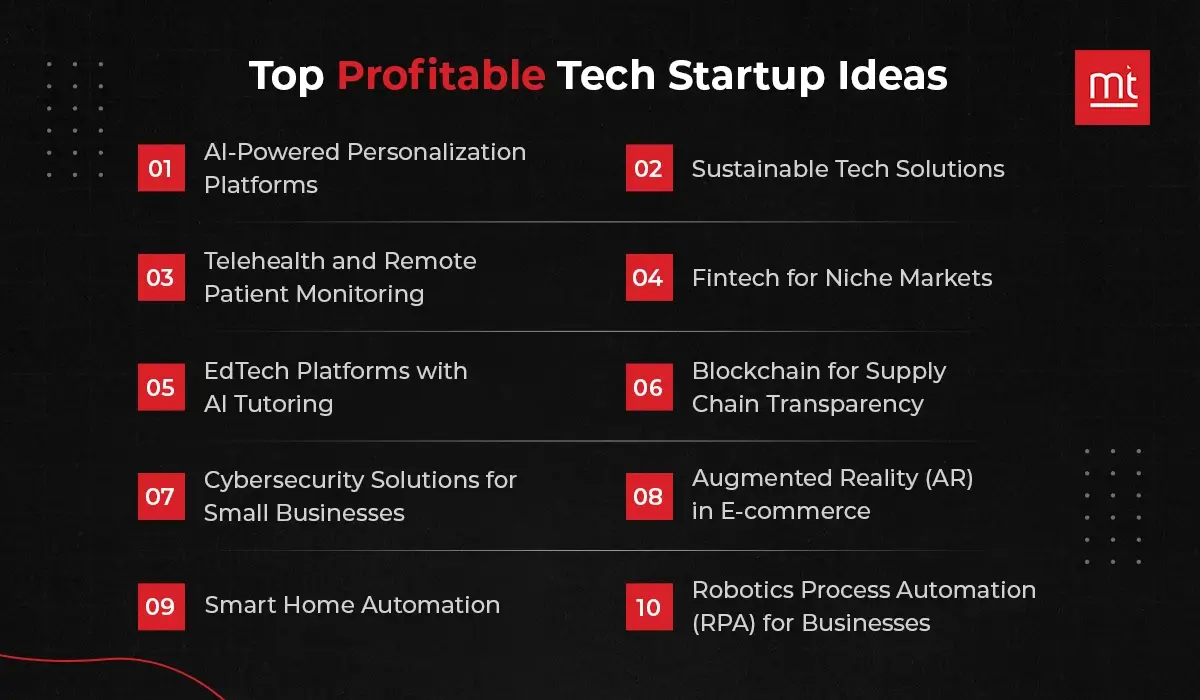
#1. AI-Powered Personalization Platforms
- Industry/Category: AI-powered personalization platforms cater to businesses across various sectors, including e-commerce, media, and entertainment. These platforms utilise machine learning algorithms to analyse user behaviour and preferences, delivering personalised recommendations, content, and experiences.
- Possible Business Model/s: Business models for AI-powered personalization platforms can include subscription-based services, licensing fees for access to the platform, or revenue-sharing arrangements with clients based on the performance of personalised recommendations in driving sales or engagement.
- MVP Build Time: The minimum viable product (MVP) for an AI-powered personalization platform can typically be developed within 6-12 months, depending on the complexity of algorithms, data integration requirements, and customization options.
- Successful Examples: Examples of successful AI-powered personalization platforms include Netflix, which uses machine learning to recommend personalised content to its users, and Spotify, which leverages AI algorithms to curate customised playlists based on user preferences and listening habits.
#2. Sustainable Tech Solutions
- Industry/Category: Sustainable tech solutions encompass a wide range of sectors, including renewable energy, waste management, agriculture, transportation, and construction. These solutions aim to address environmental challenges and promote sustainable practices through the use of technology.
- Possible Business Model/s: Business models for sustainable tech solutions can include product sales, subscription-based services for ongoing maintenance and support, project-based consulting or implementation services, and partnerships with government agencies or corporate clients for funding or sponsorship.
- MVP Build Time: The MVP for sustainable tech solutions can vary significantly depending on the specific solution being developed. For example, a solar energy monitoring system may require 6-9 months for MVP development, while an intelligent waste management solution could take 9-12 months.
- Successful Examples: Examples of successful sustainable tech startups include Tesla, known for its electric vehicles and energy storage solutions, and Beyond Meat, which produces plant-based meat alternatives to reduce the environmental impact of meat consumption.
#3. Telehealth and Remote Patient Monitoring
- Industry/Category: Telehealth and remote patient monitoring solutions are focused on the healthcare industry, enabling remote consultations, monitoring of vital signs, and delivery of medical services over digital platforms.
- Possible Business Model/s: Business models for telehealth and remote patient monitoring can include subscription-based telemedicine platforms, pay-per-visit or pay-per-service models, partnerships with healthcare providers or insurers, and licensing fees for proprietary software or technology.
- MVP Build Time: The MVP for telehealth and remote patient monitoring solutions typically ranges from 6-12 months, depending on regulatory requirements, integration with existing healthcare systems, and customization for specific medical specialties or use cases.
- Successful Examples: Examples of successful telehealth and remote patient monitoring startups include Teladoc Health, a leading telemedicine provider offering virtual consultations with healthcare professionals, and Omron Healthcare, which develops remote monitoring devices for tracking blood pressure, heart rate, and other vital signs.
#4. Fintech for Niche Markets
- Industry/Category: Fintech startups targeting niche markets cater to specific financial needs within sectors like healthcare, real estate, or agriculture. These startups offer tailored financial solutions that traditional banks or financial institutions may overlook.
- Possible Business Model/s: Subscription-based services, transaction fees, licensing fees, or commission-based revenue models are expected for fintech startups targeting niche markets. They may also offer premium features or personalised services for a subscription fee.
- MVP Build Time: The MVP (Minimum Viable Product) build time for a fintech startup targeting niche markets can vary depending on the complexity of the solution. It typically takes between 3 and 6 months to develop a basic MVP, with additional time required for testing and iterations.
- Successful Examples: One successful example is Cadence, a fintech startup that focuses on alternative investments in areas like litigation finance and real estate. Cadence offers investment opportunities to accredited investors, providing access to asset classes traditionally reserved for institutional investors.
#5. EdTech Platforms with AI Tutoring
- Industry/Category: EdTech startups leveraging AI tutoring cater to the education sector, providing personalised learning experiences to students of all ages. These platforms use artificial intelligence algorithms to adapt learning materials and teaching methods to individual student needs.
- Possible Business Model/s: Subscription-based models, pay-per-use models, or freemium models with AI tutoring features are expected for EdTech startups. They may offer tiered pricing plans based on the level of access to content or additional features.
- MVP Build Time: Building an MVP for an EdTech platform with AI tutoring capabilities typically takes around 6 to 9 months. This timeframe includes developing the AI algorithms, creating the platform interface, and integrating content.
- Successful Examples: Duolingo, an AI-powered language learning platform, is a notable success in the EdTech space. Duolingo uses AI algorithms to personalise learning paths for users, making language learning more engaging and effective.
#6. Blockchain for Supply Chain Transparency
- Industry/Category: Blockchain startups focusing on supply chain transparency aim to revolutionise industries like manufacturing, food and agriculture, and logistics by providing immutable records of transactions and product movements.
- Possible Business Model/s: Subscription-based services, licensing fees, or transaction fees are standard revenue models for blockchain startups in supply chain transparency. They may also offer consulting services or premium features for enterprise clients.
- MVP Build Time: Developing an MVP for a blockchain startup targeting supply chain transparency typically takes between 6 to 12 months. This timeframe includes building the blockchain infrastructure, developing smart contracts, and integrating with existing supply chain systems.
- Successful Examples: VeChain is a successful blockchain startup that focuses on supply chain management and product authentication. VeChain's blockchain platform enables businesses to track the entire lifecycle of products, ensuring transparency and authenticity for consumers.
#7. Cybersecurity Solutions for Small Businesses
- Industry/Category: With the increasing digitalization of business operations, cybersecurity has become a top priority for companies of all sizes. Small businesses, in particular, are vulnerable to cyber threats due to limited resources and expertise in this area.
- Possible Business Model/s: Tech startups can offer subscription-based cybersecurity solutions tailored to the needs and budget constraints of small businesses. It could include services such as antivirus software, firewall protection, threat detection, and data encryption.
- MVP Build Time: The minimum viable product (MVP) for a cybersecurity solution for small businesses could take anywhere from 6 to 12 months to develop, depending on the complexity of the features and functionality.
- Successful Examples: One successful example is CrowdStrike, a cybersecurity company that offers cloud-native endpoint protection for businesses of all sizes, including small enterprises.
#8. Augmented Reality (AR) in E-commerce
- Industry/Category: E-commerce has seen tremendous growth in recent years, and integrating augmented reality technology can revolutionise the online shopping experience by allowing customers to visualise products in real-world settings.
- Possible Business Model/s: Tech startups can develop AR-powered e-commerce platforms or mobile apps that enable users to try on clothes virtually, visualise furniture in their homes, or preview products before making a purchase. Revenue streams could come from subscription fees, in-app purchases, or partnerships with e-commerce retailers.
- MVP Build Time: Building an MVP for an AR e-commerce platform typically takes around 9 to 12 months, including the development of basic AR features and integration with existing e-commerce systems.
- Successful Examples: Warby Parker, an eyewear retailer, offers a virtual try-on feature on its website and mobile app, allowing customers to see how glasses look on their face using AR technology.
#9. Smart Home Automation
- Industry/Category: The smart home market is booming, driven by the increasing adoption of connected devices and Internet of Things (IoT) technology. Smart home automation solutions offer convenience, energy efficiency, and security to homeowners.
- Possible Business Model/s: Tech startups can develop smart home automation systems that integrate with various IoT devices, such as thermostats, lighting controls, security cameras, and smart locks. Business models could include selling hardware devices, subscription-based services for remote monitoring and control, and partnerships with home builders or IoT device manufacturers.
- MVP Build Time: Building an MVP for a smart home automation system may take around 6 to 9 months, depending on the complexity of the hardware and software components.
- Successful Examples: Nest, now a subsidiary of Google, offers a range of smart home products, including thermostats, cameras, and smoke detectors, that can be controlled remotely via a mobile app.
#10. Robotics Process Automation (RPA) for Businesses
- Industry/Category: Robotics process automation (RPA) involves using software robots or artificial intelligence (AI) to automate repetitive tasks and processes in business operations.
- Possible Business Model/s: Tech startups can develop RPA solutions for various industries, such as finance, healthcare, and manufacturing, to streamline workflows, reduce human error, and increase efficiency. Business models may include licensing fees based on the number of bots deployed, consulting services for process automation, and training programs for employees.
- MVP Build Time: Building an MVP for an RPA solution typically takes around 6 to 9 months, including the development of basic automation capabilities and integration with existing business systems.
- Successful Examples: UiPath, a leading RPA software company, offers a platform that enables businesses to automate repetitive tasks, such as data entry, invoice processing, and customer service, using software robots.
Case Studies of Tech Startups That Succeeded
To provide case studies of successful tech startups, we have compiled information from various sources:
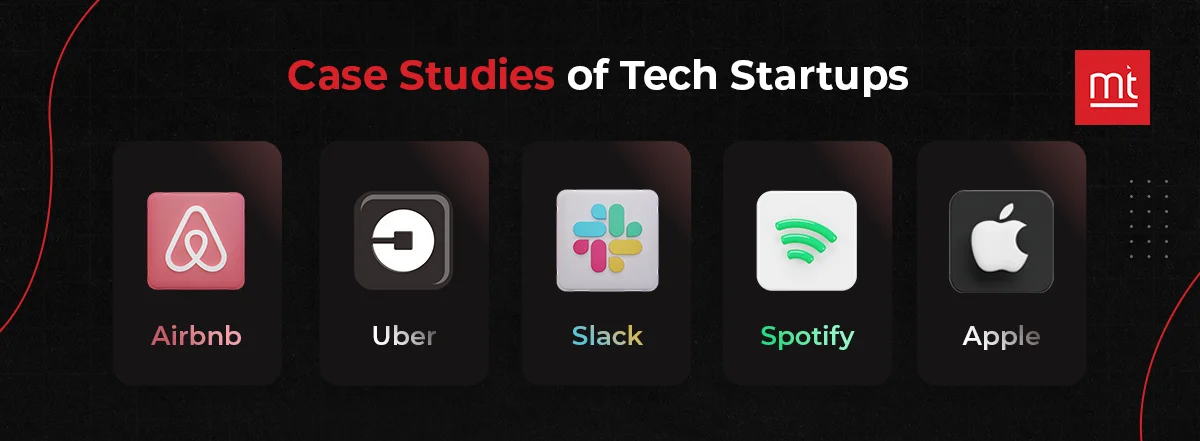
1. Airbnb
- Founded in 2008 by Joe Gebbia, Brian Chesky, and Nathan Blecharczyk
- Initially, they created an online marketplace for air mattresses and breakfast in San Francisco during the 2008 Democratic National Convention.
- By 2010, Airbnb had expanded to over 8,000 cities worldwide.
- As of 2023, Airbnb is valued at $45 billion.
2. Uber
- Founded in 2009 by Garrett Camp and Travis Kalanick
- Initially, they created a mobile app that connected passengers with drivers in San Francisco
- By 2011, Uber had expanded to New York City and other major cities worldwide
- As of 2023, Uber is valued at $41 billion.
3. Slack
- Founded in 2009 by Stewart Butterfield, Cal Henderson, Eric Costello, and Serguei Mourachov
- Initially, they created a game called Glitch but pivoted to a team communication tool
- By 2014, Slack had gained over 1 million daily active users
- As of 2023, Slack is valued at $15.7 billion.
4. Spotify
- Founded in 2006 by Daniel Ek and Martin Lorentzon
- Initially, they created a music streaming service in Stockholm, Sweden
- By 2011, Spotify had expanded to the United States and other major markets worldwide
- As of 2023, Spotify is valued at $31 billion.
5. Apple
- Founded in 1976 by Steve Jobs, Steve Wozniak, and Ronald Wayne
- Initially, they created the Apple I personal computer
- By 1980, Apple had expanded to the Apple II personal computer
- As of 2023, Apple is valued at $2.4 trillion.
These case studies demonstrate that successful tech startups often begin with a unique and innovative solution to a problem, a strong team, and a capital-efficient product. They also highlight the importance of persistence, adaptability, and a robust business model in achieving long-term success.
Conclusion
In conclusion, building a successful tech startup requires careful consideration of critical factors such as market demand, innovative app ideas, and effective execution strategies. We discussed several promising tech startup ideas, including cybersecurity solutions for small businesses, augmented reality in e-commerce, smart home automation, and robotics process automation for businesses. These ideas present significant opportunities for innovation and growth in their respective industries.
For aspiring tech entrepreneurs, it's essential to remember that the journey of building a startup is challenging but immensely rewarding. By focusing on solving real-world problems, staying adaptable to market changes, and leveraging available resources and networks, aspiring entrepreneurs can turn their ideas into reality. Embracing failure as a learning opportunity, seeking mentorship, and continuously iterating on their products or services are crucial aspects of the entrepreneurial journey.
Ultimately, success in the tech startup world requires perseverance, resilience, and a willingness to take calculated risks. By harnessing their creativity, passion, and drive, aspiring tech entrepreneurs can make a meaningful impact on society while building innovative solutions that shape the future. So, to all the aspiring tech entrepreneurs out there, take the leap, pursue your ideas, and dare to make a difference in the world of technology and innovation. Your journey starts now.
About Author
Subscribe to Our Newsletter!
Join us to stay updated with our latest blog updates, marketing tips, service tips, trends, news and announcements!





